Influence of Culture, Politics, and Power: A David & Co Ltd Report
VerifiedAdded on 2021/01/01
|17
|5092
|342
Report
AI Summary
This report delves into the intricacies of organizational behaviour within the context of A David & Co Limited, a food and beverage enterprise. It examines the influence of organizational culture, power dynamics, and political landscapes on individual and team performance, exploring various cultural models like person, power, role, and task cultures. The report further investigates content and process theories of motivation, including Maslow's hierarchy, ERG theory, reinforcement, expectancy, and equity theories, and their practical application. It analyzes the components of effective teams and contrasts them with ineffective ones, providing insights into team dynamics. The report also explores the interplay of organizational behaviour concepts within the given business scenario, offering a comprehensive analysis of the factors that shape behaviour and productivity within A David & Co Limited, including the various sources of power and their impact on employee motivation and performance.
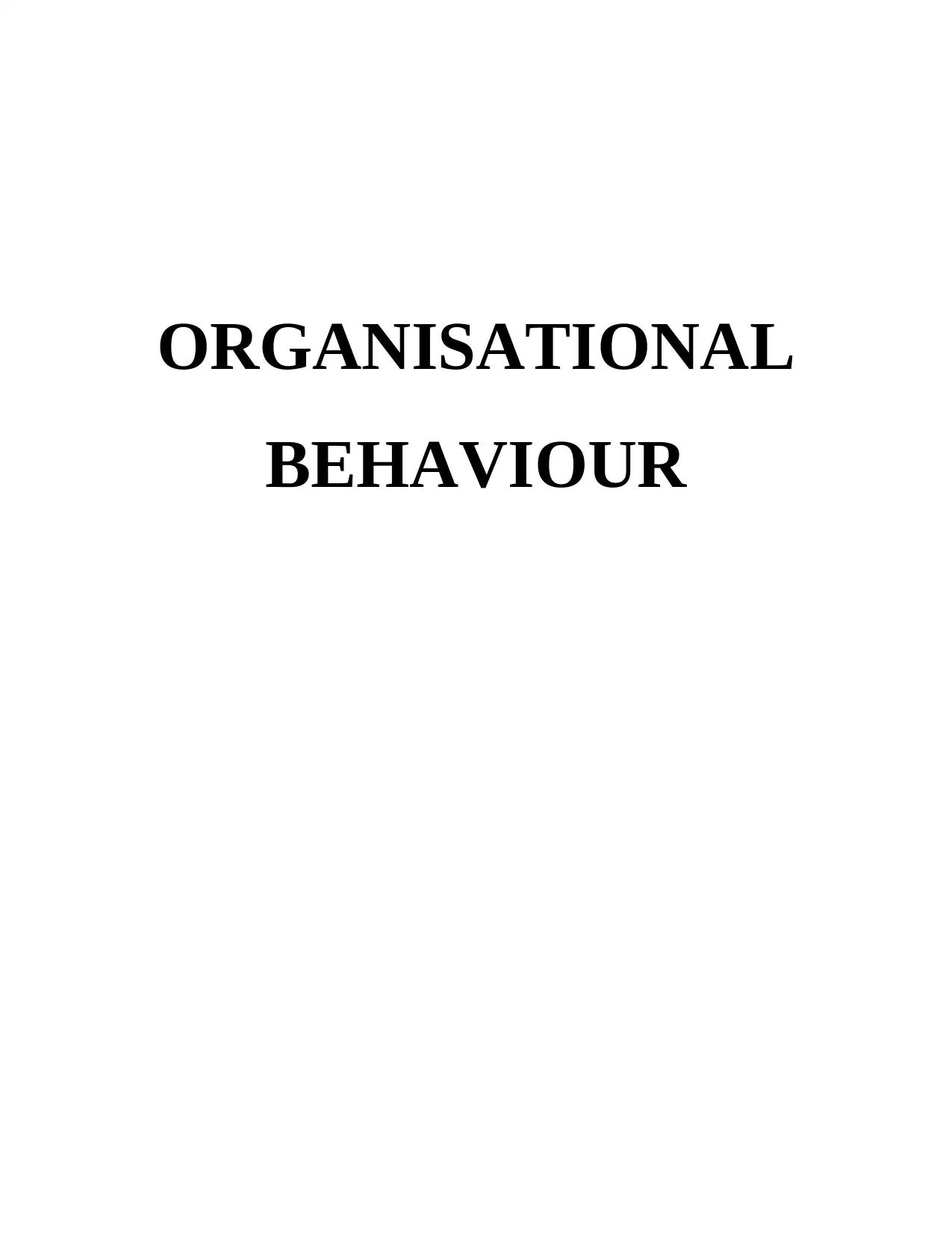
ORGANISATIONAL
BEHAVIOUR
BEHAVIOUR
Paraphrase This Document
Need a fresh take? Get an instant paraphrase of this document with our AI Paraphraser
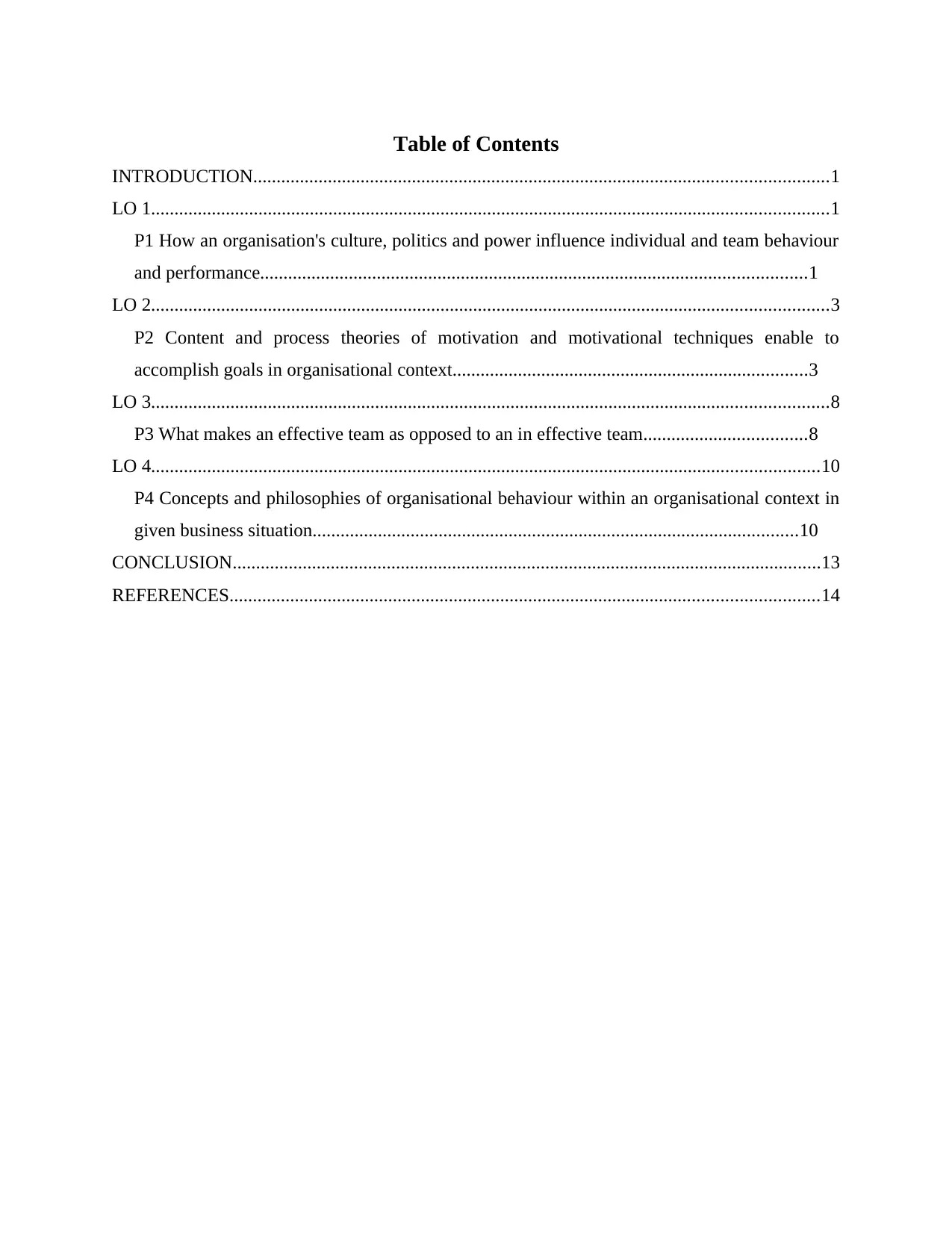
Table of Contents
INTRODUCTION...........................................................................................................................1
LO 1.................................................................................................................................................1
P1 How an organisation's culture, politics and power influence individual and team behaviour
and performance.....................................................................................................................1
LO 2.................................................................................................................................................3
P2 Content and process theories of motivation and motivational techniques enable to
accomplish goals in organisational context............................................................................3
LO 3.................................................................................................................................................8
P3 What makes an effective team as opposed to an in effective team...................................8
LO 4...............................................................................................................................................10
P4 Concepts and philosophies of organisational behaviour within an organisational context in
given business situation........................................................................................................10
CONCLUSION..............................................................................................................................13
REFERENCES..............................................................................................................................14
INTRODUCTION...........................................................................................................................1
LO 1.................................................................................................................................................1
P1 How an organisation's culture, politics and power influence individual and team behaviour
and performance.....................................................................................................................1
LO 2.................................................................................................................................................3
P2 Content and process theories of motivation and motivational techniques enable to
accomplish goals in organisational context............................................................................3
LO 3.................................................................................................................................................8
P3 What makes an effective team as opposed to an in effective team...................................8
LO 4...............................................................................................................................................10
P4 Concepts and philosophies of organisational behaviour within an organisational context in
given business situation........................................................................................................10
CONCLUSION..............................................................................................................................13
REFERENCES..............................................................................................................................14
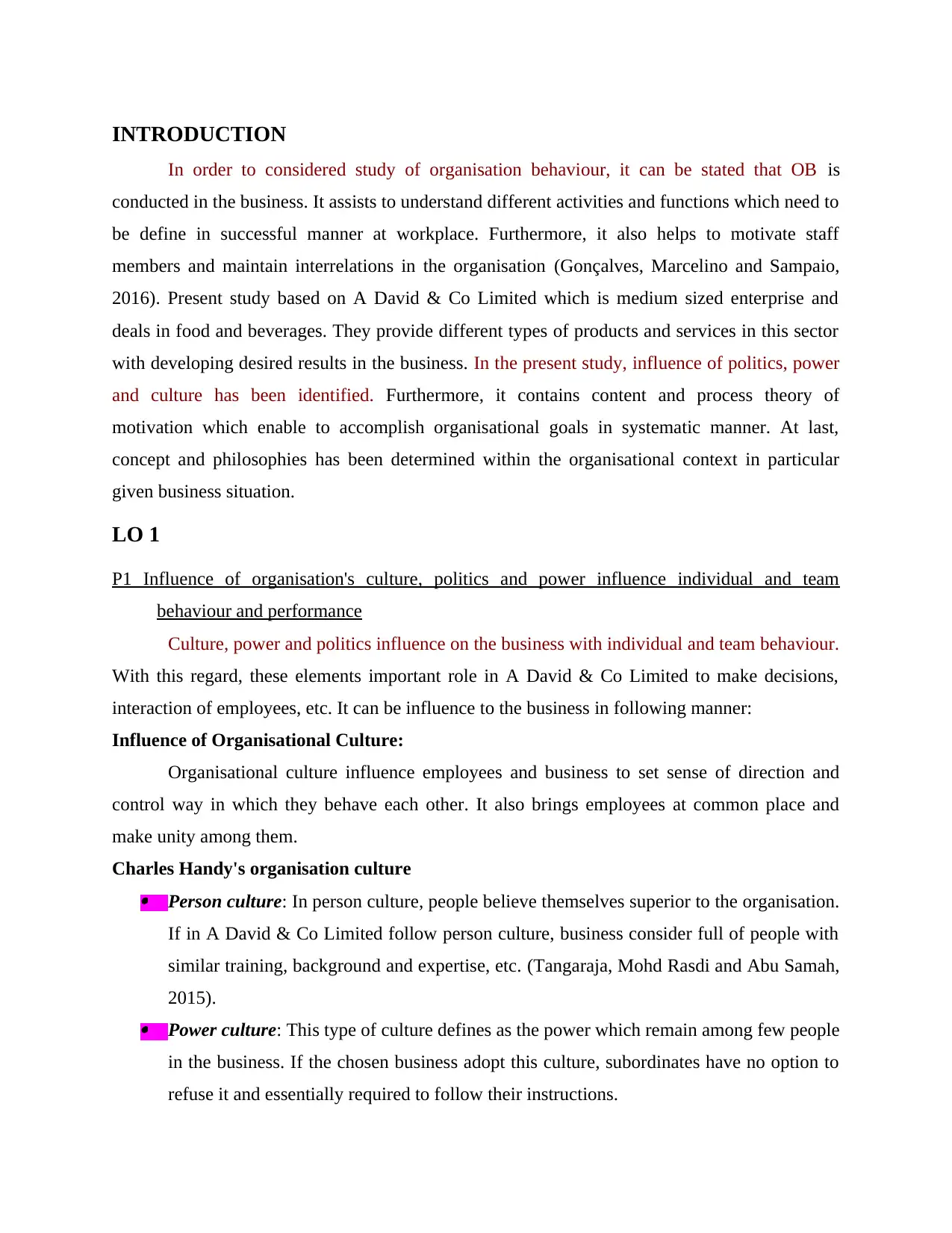
INTRODUCTION
In order to considered study of organisation behaviour, it can be stated that OB is
conducted in the business. It assists to understand different activities and functions which need to
be define in successful manner at workplace. Furthermore, it also helps to motivate staff
members and maintain interrelations in the organisation (Gonçalves, Marcelino and Sampaio,
2016). Present study based on A David & Co Limited which is medium sized enterprise and
deals in food and beverages. They provide different types of products and services in this sector
with developing desired results in the business. In the present study, influence of politics, power
and culture has been identified. Furthermore, it contains content and process theory of
motivation which enable to accomplish organisational goals in systematic manner. At last,
concept and philosophies has been determined within the organisational context in particular
given business situation.
LO 1
P1 Influence of organisation's culture, politics and power influence individual and team
behaviour and performance
Culture, power and politics influence on the business with individual and team behaviour.
With this regard, these elements important role in A David & Co Limited to make decisions,
interaction of employees, etc. It can be influence to the business in following manner:
Influence of Organisational Culture:
Organisational culture influence employees and business to set sense of direction and
control way in which they behave each other. It also brings employees at common place and
make unity among them.
Charles Handy's organisation culture Person culture: In person culture, people believe themselves superior to the organisation.
If in A David & Co Limited follow person culture, business consider full of people with
similar training, background and expertise, etc. (Tangaraja, Mohd Rasdi and Abu Samah,
2015). Power culture: This type of culture defines as the power which remain among few people
in the business. If the chosen business adopt this culture, subordinates have no option to
refuse it and essentially required to follow their instructions.
In order to considered study of organisation behaviour, it can be stated that OB is
conducted in the business. It assists to understand different activities and functions which need to
be define in successful manner at workplace. Furthermore, it also helps to motivate staff
members and maintain interrelations in the organisation (Gonçalves, Marcelino and Sampaio,
2016). Present study based on A David & Co Limited which is medium sized enterprise and
deals in food and beverages. They provide different types of products and services in this sector
with developing desired results in the business. In the present study, influence of politics, power
and culture has been identified. Furthermore, it contains content and process theory of
motivation which enable to accomplish organisational goals in systematic manner. At last,
concept and philosophies has been determined within the organisational context in particular
given business situation.
LO 1
P1 Influence of organisation's culture, politics and power influence individual and team
behaviour and performance
Culture, power and politics influence on the business with individual and team behaviour.
With this regard, these elements important role in A David & Co Limited to make decisions,
interaction of employees, etc. It can be influence to the business in following manner:
Influence of Organisational Culture:
Organisational culture influence employees and business to set sense of direction and
control way in which they behave each other. It also brings employees at common place and
make unity among them.
Charles Handy's organisation culture Person culture: In person culture, people believe themselves superior to the organisation.
If in A David & Co Limited follow person culture, business consider full of people with
similar training, background and expertise, etc. (Tangaraja, Mohd Rasdi and Abu Samah,
2015). Power culture: This type of culture defines as the power which remain among few people
in the business. If the chosen business adopt this culture, subordinates have no option to
refuse it and essentially required to follow their instructions.
⊘ This is a preview!⊘
Do you want full access?
Subscribe today to unlock all pages.

Trusted by 1+ million students worldwide
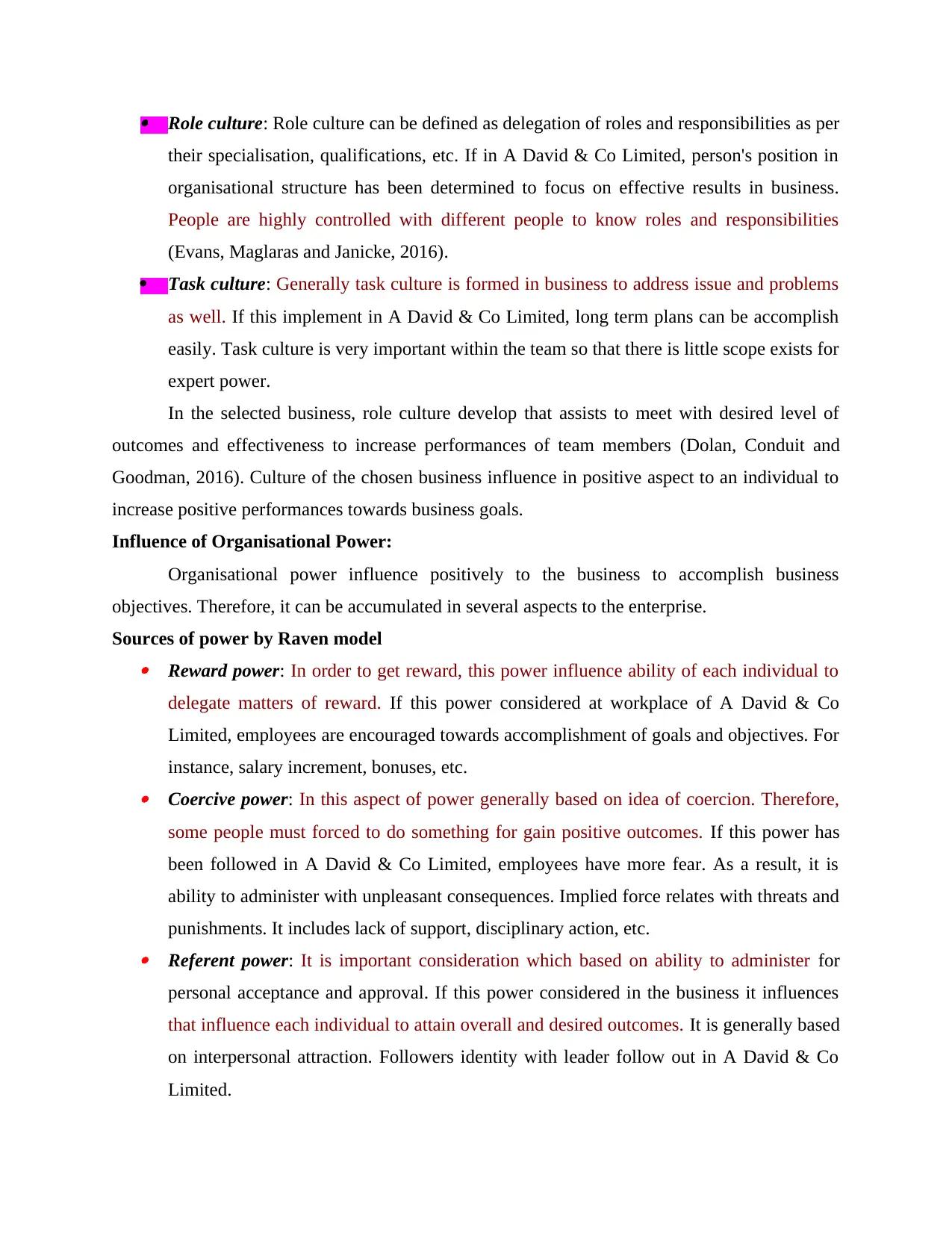
Role culture: Role culture can be defined as delegation of roles and responsibilities as per
their specialisation, qualifications, etc. If in A David & Co Limited, person's position in
organisational structure has been determined to focus on effective results in business.
People are highly controlled with different people to know roles and responsibilities
(Evans, Maglaras and Janicke, 2016).
Task culture: Generally task culture is formed in business to address issue and problems
as well. If this implement in A David & Co Limited, long term plans can be accomplish
easily. Task culture is very important within the team so that there is little scope exists for
expert power.
In the selected business, role culture develop that assists to meet with desired level of
outcomes and effectiveness to increase performances of team members (Dolan, Conduit and
Goodman, 2016). Culture of the chosen business influence in positive aspect to an individual to
increase positive performances towards business goals.
Influence of Organisational Power:
Organisational power influence positively to the business to accomplish business
objectives. Therefore, it can be accumulated in several aspects to the enterprise.
Sources of power by Raven model Reward power: In order to get reward, this power influence ability of each individual to
delegate matters of reward. If this power considered at workplace of A David & Co
Limited, employees are encouraged towards accomplishment of goals and objectives. For
instance, salary increment, bonuses, etc. Coercive power: In this aspect of power generally based on idea of coercion. Therefore,
some people must forced to do something for gain positive outcomes. If this power has
been followed in A David & Co Limited, employees have more fear. As a result, it is
ability to administer with unpleasant consequences. Implied force relates with threats and
punishments. It includes lack of support, disciplinary action, etc. Referent power: It is important consideration which based on ability to administer for
personal acceptance and approval. If this power considered in the business it influences
that influence each individual to attain overall and desired outcomes. It is generally based
on interpersonal attraction. Followers identity with leader follow out in A David & Co
Limited.
their specialisation, qualifications, etc. If in A David & Co Limited, person's position in
organisational structure has been determined to focus on effective results in business.
People are highly controlled with different people to know roles and responsibilities
(Evans, Maglaras and Janicke, 2016).
Task culture: Generally task culture is formed in business to address issue and problems
as well. If this implement in A David & Co Limited, long term plans can be accomplish
easily. Task culture is very important within the team so that there is little scope exists for
expert power.
In the selected business, role culture develop that assists to meet with desired level of
outcomes and effectiveness to increase performances of team members (Dolan, Conduit and
Goodman, 2016). Culture of the chosen business influence in positive aspect to an individual to
increase positive performances towards business goals.
Influence of Organisational Power:
Organisational power influence positively to the business to accomplish business
objectives. Therefore, it can be accumulated in several aspects to the enterprise.
Sources of power by Raven model Reward power: In order to get reward, this power influence ability of each individual to
delegate matters of reward. If this power considered at workplace of A David & Co
Limited, employees are encouraged towards accomplishment of goals and objectives. For
instance, salary increment, bonuses, etc. Coercive power: In this aspect of power generally based on idea of coercion. Therefore,
some people must forced to do something for gain positive outcomes. If this power has
been followed in A David & Co Limited, employees have more fear. As a result, it is
ability to administer with unpleasant consequences. Implied force relates with threats and
punishments. It includes lack of support, disciplinary action, etc. Referent power: It is important consideration which based on ability to administer for
personal acceptance and approval. If this power considered in the business it influences
that influence each individual to attain overall and desired outcomes. It is generally based
on interpersonal attraction. Followers identity with leader follow out in A David & Co
Limited.
Paraphrase This Document
Need a fresh take? Get an instant paraphrase of this document with our AI Paraphraser
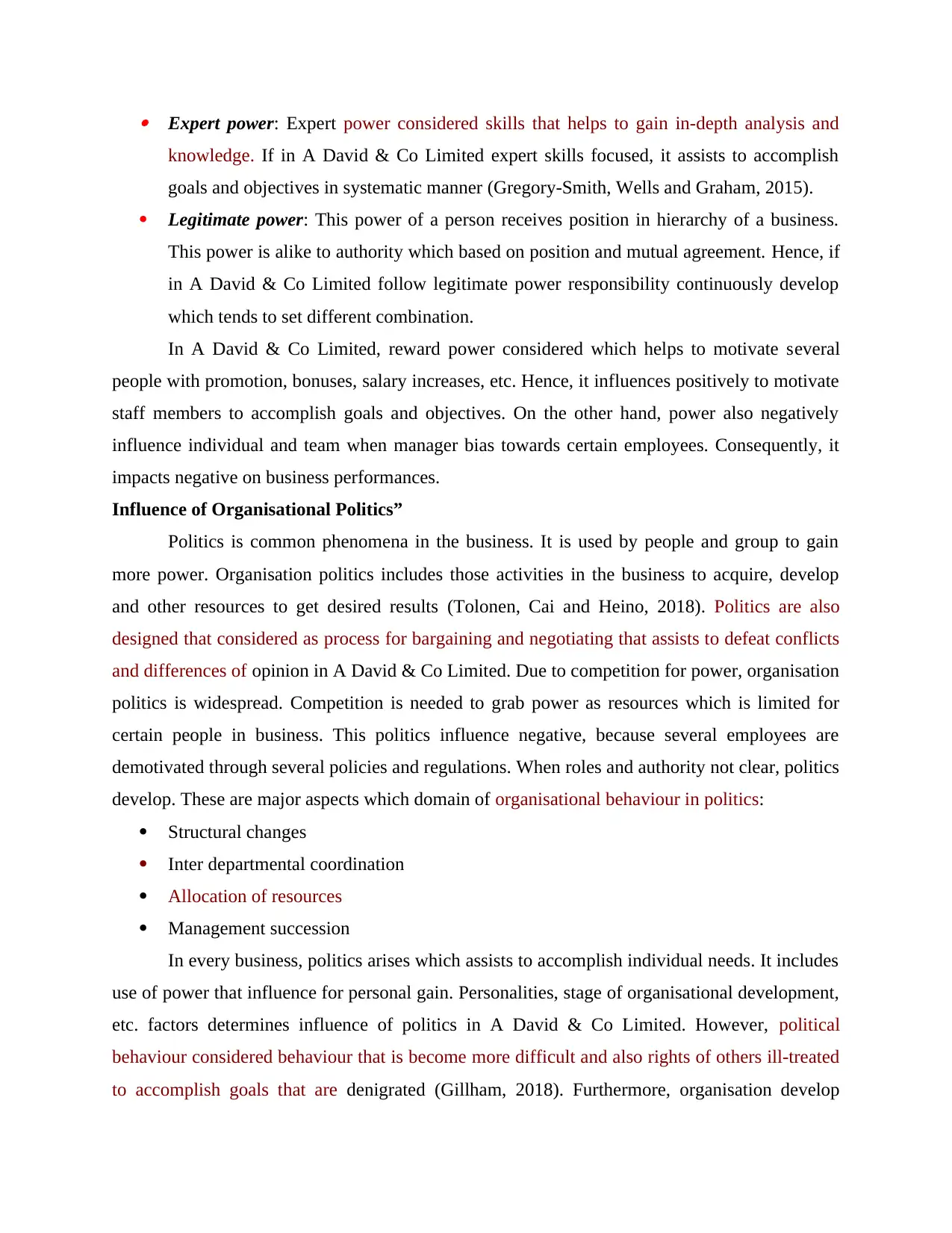
Expert power: Expert power considered skills that helps to gain in-depth analysis and
knowledge. If in A David & Co Limited expert skills focused, it assists to accomplish
goals and objectives in systematic manner (Gregory-Smith, Wells and Graham, 2015).
Legitimate power: This power of a person receives position in hierarchy of a business.
This power is alike to authority which based on position and mutual agreement. Hence, if
in A David & Co Limited follow legitimate power responsibility continuously develop
which tends to set different combination.
In A David & Co Limited, reward power considered which helps to motivate several
people with promotion, bonuses, salary increases, etc. Hence, it influences positively to motivate
staff members to accomplish goals and objectives. On the other hand, power also negatively
influence individual and team when manager bias towards certain employees. Consequently, it
impacts negative on business performances.
Influence of Organisational Politics”
Politics is common phenomena in the business. It is used by people and group to gain
more power. Organisation politics includes those activities in the business to acquire, develop
and other resources to get desired results (Tolonen, Cai and Heino, 2018). Politics are also
designed that considered as process for bargaining and negotiating that assists to defeat conflicts
and differences of opinion in A David & Co Limited. Due to competition for power, organisation
politics is widespread. Competition is needed to grab power as resources which is limited for
certain people in business. This politics influence negative, because several employees are
demotivated through several policies and regulations. When roles and authority not clear, politics
develop. These are major aspects which domain of organisational behaviour in politics:
Structural changes
Inter departmental coordination
Allocation of resources
Management succession
In every business, politics arises which assists to accomplish individual needs. It includes
use of power that influence for personal gain. Personalities, stage of organisational development,
etc. factors determines influence of politics in A David & Co Limited. However, political
behaviour considered behaviour that is become more difficult and also rights of others ill-treated
to accomplish goals that are denigrated (Gillham, 2018). Furthermore, organisation develop
knowledge. If in A David & Co Limited expert skills focused, it assists to accomplish
goals and objectives in systematic manner (Gregory-Smith, Wells and Graham, 2015).
Legitimate power: This power of a person receives position in hierarchy of a business.
This power is alike to authority which based on position and mutual agreement. Hence, if
in A David & Co Limited follow legitimate power responsibility continuously develop
which tends to set different combination.
In A David & Co Limited, reward power considered which helps to motivate several
people with promotion, bonuses, salary increases, etc. Hence, it influences positively to motivate
staff members to accomplish goals and objectives. On the other hand, power also negatively
influence individual and team when manager bias towards certain employees. Consequently, it
impacts negative on business performances.
Influence of Organisational Politics”
Politics is common phenomena in the business. It is used by people and group to gain
more power. Organisation politics includes those activities in the business to acquire, develop
and other resources to get desired results (Tolonen, Cai and Heino, 2018). Politics are also
designed that considered as process for bargaining and negotiating that assists to defeat conflicts
and differences of opinion in A David & Co Limited. Due to competition for power, organisation
politics is widespread. Competition is needed to grab power as resources which is limited for
certain people in business. This politics influence negative, because several employees are
demotivated through several policies and regulations. When roles and authority not clear, politics
develop. These are major aspects which domain of organisational behaviour in politics:
Structural changes
Inter departmental coordination
Allocation of resources
Management succession
In every business, politics arises which assists to accomplish individual needs. It includes
use of power that influence for personal gain. Personalities, stage of organisational development,
etc. factors determines influence of politics in A David & Co Limited. However, political
behaviour considered behaviour that is become more difficult and also rights of others ill-treated
to accomplish goals that are denigrated (Gillham, 2018). Furthermore, organisation develop
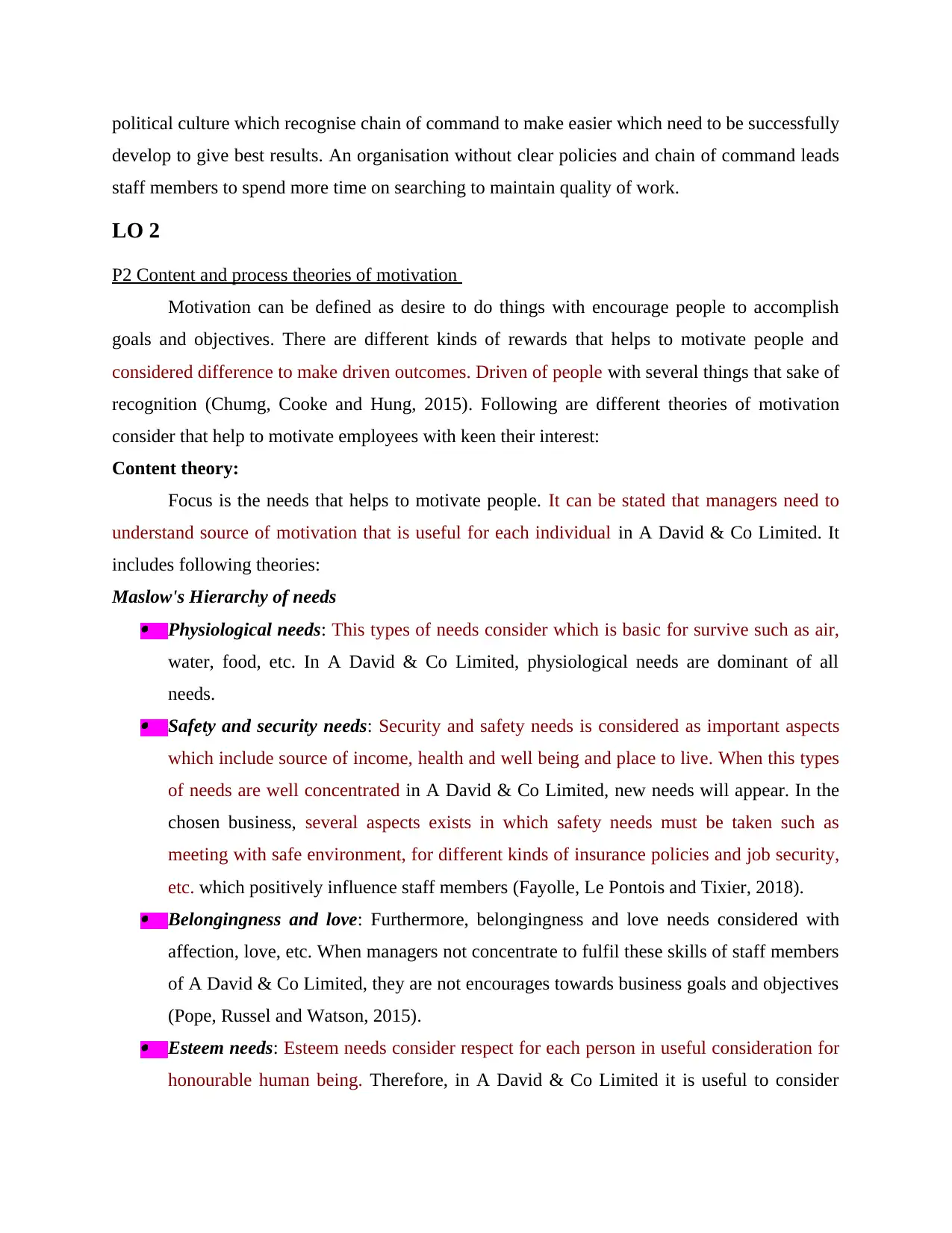
political culture which recognise chain of command to make easier which need to be successfully
develop to give best results. An organisation without clear policies and chain of command leads
staff members to spend more time on searching to maintain quality of work.
LO 2
P2 Content and process theories of motivation
Motivation can be defined as desire to do things with encourage people to accomplish
goals and objectives. There are different kinds of rewards that helps to motivate people and
considered difference to make driven outcomes. Driven of people with several things that sake of
recognition (Chumg, Cooke and Hung, 2015). Following are different theories of motivation
consider that help to motivate employees with keen their interest:
Content theory:
Focus is the needs that helps to motivate people. It can be stated that managers need to
understand source of motivation that is useful for each individual in A David & Co Limited. It
includes following theories:
Maslow's Hierarchy of needs Physiological needs: This types of needs consider which is basic for survive such as air,
water, food, etc. In A David & Co Limited, physiological needs are dominant of all
needs. Safety and security needs: Security and safety needs is considered as important aspects
which include source of income, health and well being and place to live. When this types
of needs are well concentrated in A David & Co Limited, new needs will appear. In the
chosen business, several aspects exists in which safety needs must be taken such as
meeting with safe environment, for different kinds of insurance policies and job security,
etc. which positively influence staff members (Fayolle, Le Pontois and Tixier, 2018). Belongingness and love: Furthermore, belongingness and love needs considered with
affection, love, etc. When managers not concentrate to fulfil these skills of staff members
of A David & Co Limited, they are not encourages towards business goals and objectives
(Pope, Russel and Watson, 2015). Esteem needs: Esteem needs consider respect for each person in useful consideration for
honourable human being. Therefore, in A David & Co Limited it is useful to consider
develop to give best results. An organisation without clear policies and chain of command leads
staff members to spend more time on searching to maintain quality of work.
LO 2
P2 Content and process theories of motivation
Motivation can be defined as desire to do things with encourage people to accomplish
goals and objectives. There are different kinds of rewards that helps to motivate people and
considered difference to make driven outcomes. Driven of people with several things that sake of
recognition (Chumg, Cooke and Hung, 2015). Following are different theories of motivation
consider that help to motivate employees with keen their interest:
Content theory:
Focus is the needs that helps to motivate people. It can be stated that managers need to
understand source of motivation that is useful for each individual in A David & Co Limited. It
includes following theories:
Maslow's Hierarchy of needs Physiological needs: This types of needs consider which is basic for survive such as air,
water, food, etc. In A David & Co Limited, physiological needs are dominant of all
needs. Safety and security needs: Security and safety needs is considered as important aspects
which include source of income, health and well being and place to live. When this types
of needs are well concentrated in A David & Co Limited, new needs will appear. In the
chosen business, several aspects exists in which safety needs must be taken such as
meeting with safe environment, for different kinds of insurance policies and job security,
etc. which positively influence staff members (Fayolle, Le Pontois and Tixier, 2018). Belongingness and love: Furthermore, belongingness and love needs considered with
affection, love, etc. When managers not concentrate to fulfil these skills of staff members
of A David & Co Limited, they are not encourages towards business goals and objectives
(Pope, Russel and Watson, 2015). Esteem needs: Esteem needs consider respect for each person in useful consideration for
honourable human being. Therefore, in A David & Co Limited it is useful to consider
⊘ This is a preview!⊘
Do you want full access?
Subscribe today to unlock all pages.

Trusted by 1+ million students worldwide
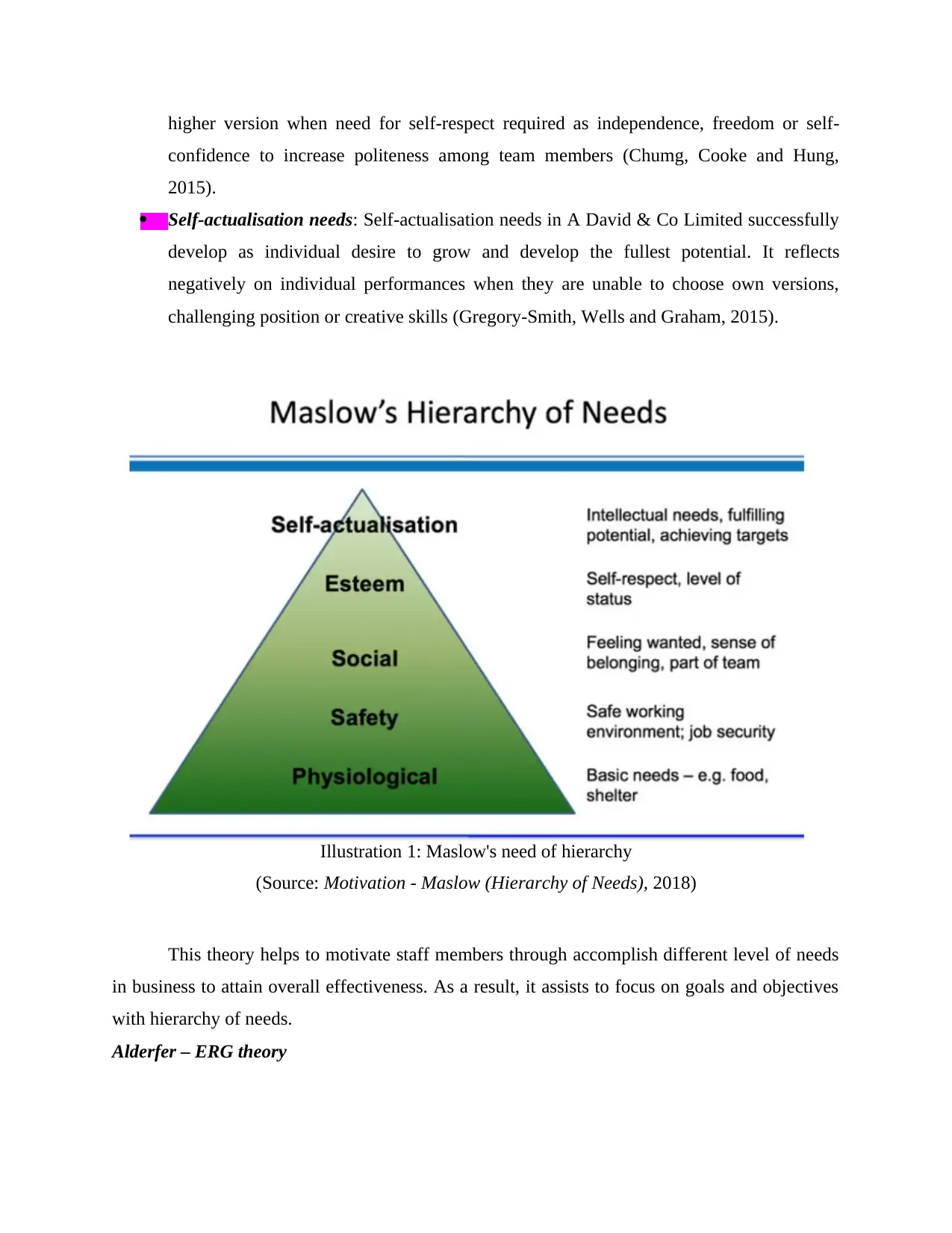
higher version when need for self-respect required as independence, freedom or self-
confidence to increase politeness among team members (Chumg, Cooke and Hung,
2015).
Self-actualisation needs: Self-actualisation needs in A David & Co Limited successfully
develop as individual desire to grow and develop the fullest potential. It reflects
negatively on individual performances when they are unable to choose own versions,
challenging position or creative skills (Gregory-Smith, Wells and Graham, 2015).
This theory helps to motivate staff members through accomplish different level of needs
in business to attain overall effectiveness. As a result, it assists to focus on goals and objectives
with hierarchy of needs.
Alderfer – ERG theory
Illustration 1: Maslow's need of hierarchy
(Source: Motivation - Maslow (Hierarchy of Needs), 2018)
confidence to increase politeness among team members (Chumg, Cooke and Hung,
2015).
Self-actualisation needs: Self-actualisation needs in A David & Co Limited successfully
develop as individual desire to grow and develop the fullest potential. It reflects
negatively on individual performances when they are unable to choose own versions,
challenging position or creative skills (Gregory-Smith, Wells and Graham, 2015).
This theory helps to motivate staff members through accomplish different level of needs
in business to attain overall effectiveness. As a result, it assists to focus on goals and objectives
with hierarchy of needs.
Alderfer – ERG theory
Illustration 1: Maslow's need of hierarchy
(Source: Motivation - Maslow (Hierarchy of Needs), 2018)
Paraphrase This Document
Need a fresh take? Get an instant paraphrase of this document with our AI Paraphraser
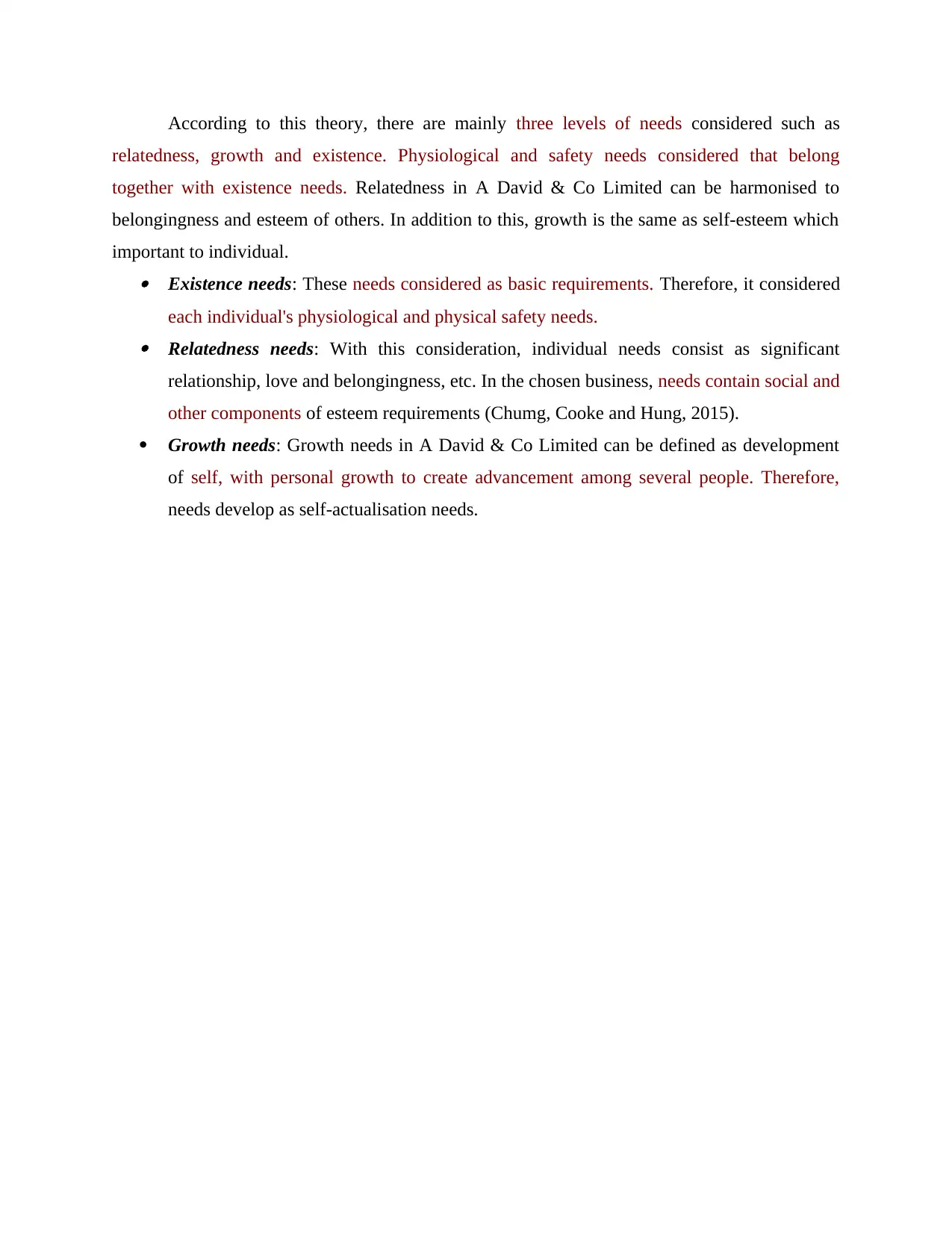
According to this theory, there are mainly three levels of needs considered such as
relatedness, growth and existence. Physiological and safety needs considered that belong
together with existence needs. Relatedness in A David & Co Limited can be harmonised to
belongingness and esteem of others. In addition to this, growth is the same as self-esteem which
important to individual. Existence needs: These needs considered as basic requirements. Therefore, it considered
each individual's physiological and physical safety needs. Relatedness needs: With this consideration, individual needs consist as significant
relationship, love and belongingness, etc. In the chosen business, needs contain social and
other components of esteem requirements (Chumg, Cooke and Hung, 2015).
Growth needs: Growth needs in A David & Co Limited can be defined as development
of self, with personal growth to create advancement among several people. Therefore,
needs develop as self-actualisation needs.
relatedness, growth and existence. Physiological and safety needs considered that belong
together with existence needs. Relatedness in A David & Co Limited can be harmonised to
belongingness and esteem of others. In addition to this, growth is the same as self-esteem which
important to individual. Existence needs: These needs considered as basic requirements. Therefore, it considered
each individual's physiological and physical safety needs. Relatedness needs: With this consideration, individual needs consist as significant
relationship, love and belongingness, etc. In the chosen business, needs contain social and
other components of esteem requirements (Chumg, Cooke and Hung, 2015).
Growth needs: Growth needs in A David & Co Limited can be defined as development
of self, with personal growth to create advancement among several people. Therefore,
needs develop as self-actualisation needs.
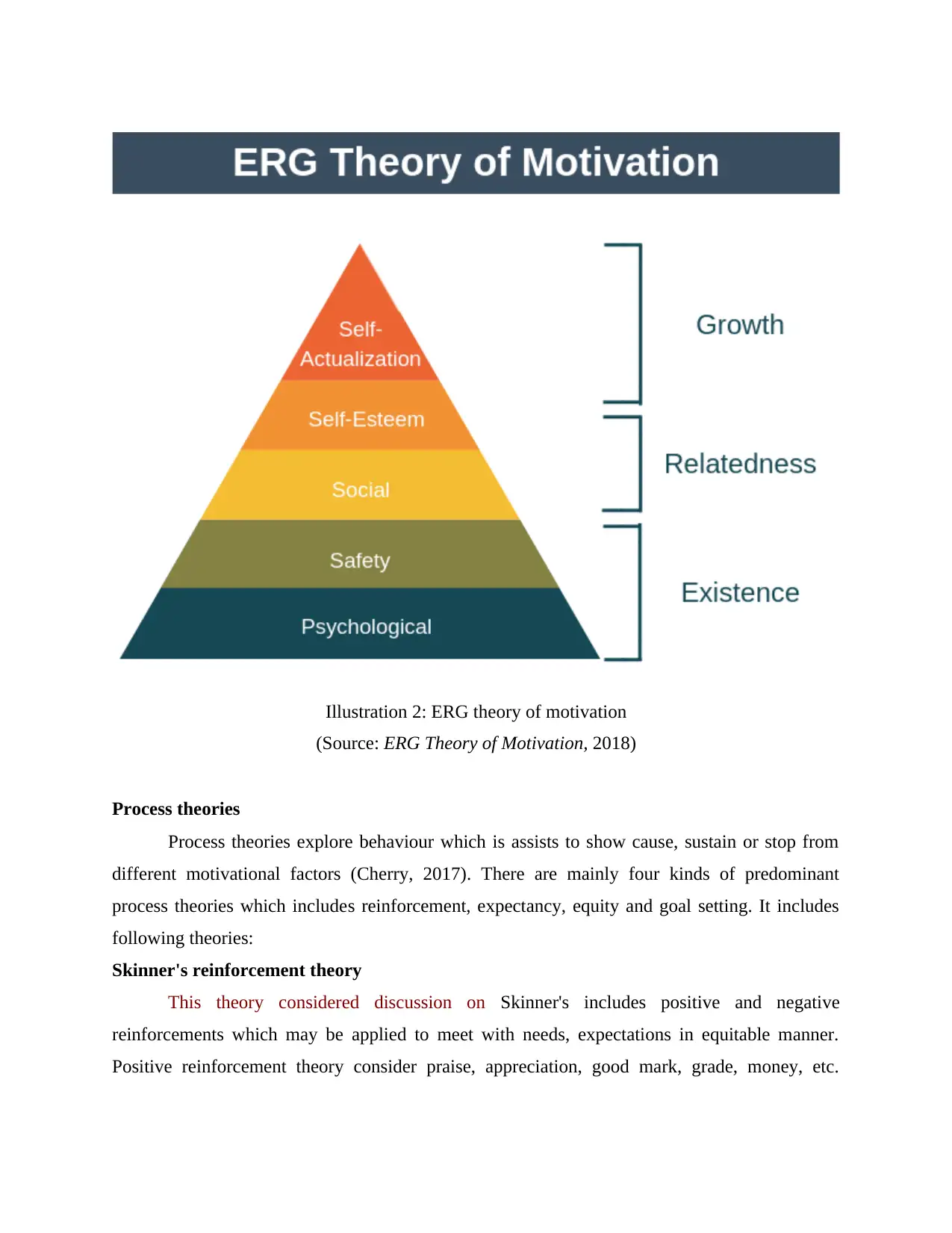
Process theories
Process theories explore behaviour which is assists to show cause, sustain or stop from
different motivational factors (Cherry, 2017). There are mainly four kinds of predominant
process theories which includes reinforcement, expectancy, equity and goal setting. It includes
following theories:
Skinner's reinforcement theory
This theory considered discussion on Skinner's includes positive and negative
reinforcements which may be applied to meet with needs, expectations in equitable manner.
Positive reinforcement theory consider praise, appreciation, good mark, grade, money, etc.
Illustration 2: ERG theory of motivation
(Source: ERG Theory of Motivation, 2018)
Process theories explore behaviour which is assists to show cause, sustain or stop from
different motivational factors (Cherry, 2017). There are mainly four kinds of predominant
process theories which includes reinforcement, expectancy, equity and goal setting. It includes
following theories:
Skinner's reinforcement theory
This theory considered discussion on Skinner's includes positive and negative
reinforcements which may be applied to meet with needs, expectations in equitable manner.
Positive reinforcement theory consider praise, appreciation, good mark, grade, money, etc.
Illustration 2: ERG theory of motivation
(Source: ERG Theory of Motivation, 2018)
⊘ This is a preview!⊘
Do you want full access?
Subscribe today to unlock all pages.

Trusted by 1+ million students worldwide
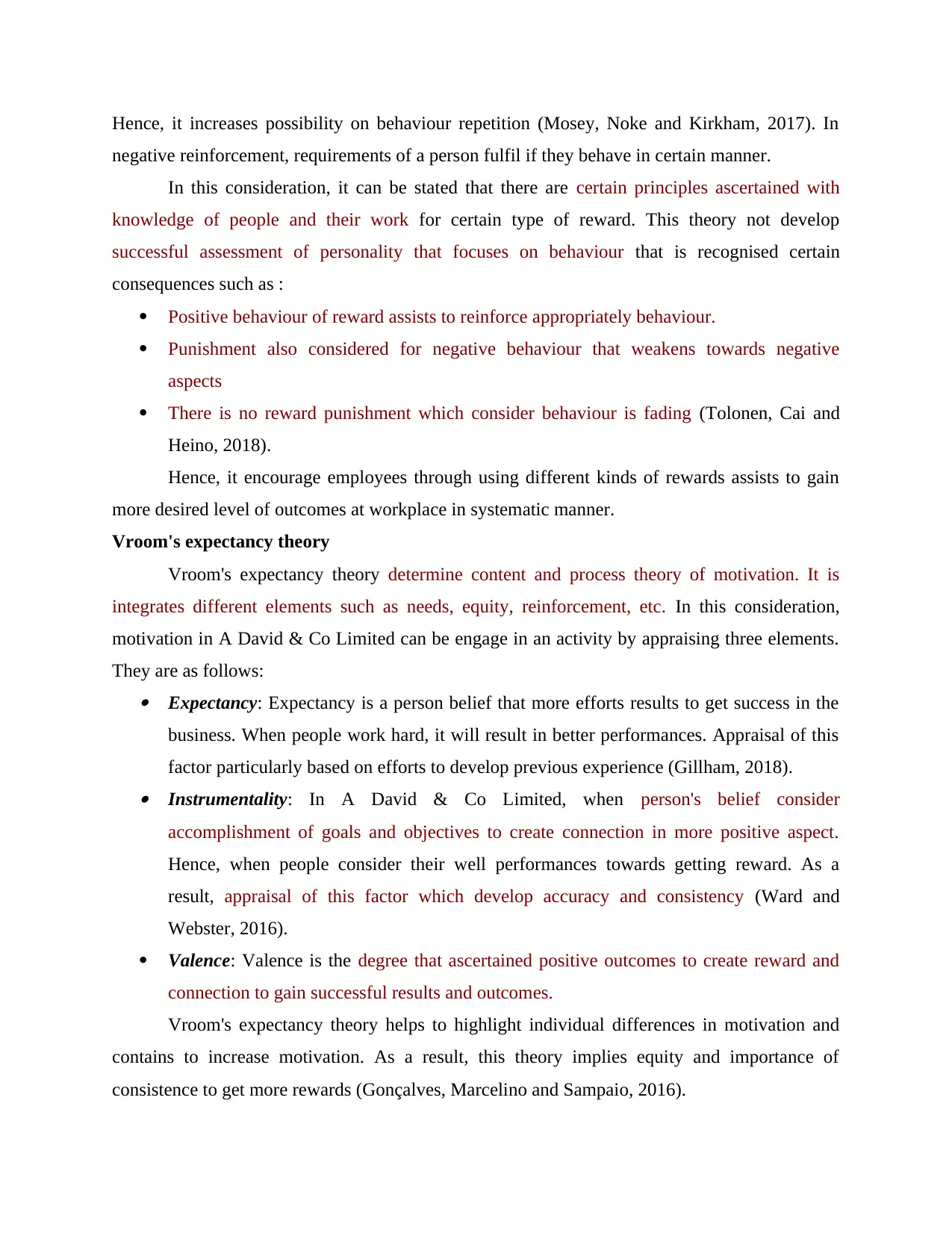
Hence, it increases possibility on behaviour repetition (Mosey, Noke and Kirkham, 2017). In
negative reinforcement, requirements of a person fulfil if they behave in certain manner.
In this consideration, it can be stated that there are certain principles ascertained with
knowledge of people and their work for certain type of reward. This theory not develop
successful assessment of personality that focuses on behaviour that is recognised certain
consequences such as :
Positive behaviour of reward assists to reinforce appropriately behaviour.
Punishment also considered for negative behaviour that weakens towards negative
aspects
There is no reward punishment which consider behaviour is fading (Tolonen, Cai and
Heino, 2018).
Hence, it encourage employees through using different kinds of rewards assists to gain
more desired level of outcomes at workplace in systematic manner.
Vroom's expectancy theory
Vroom's expectancy theory determine content and process theory of motivation. It is
integrates different elements such as needs, equity, reinforcement, etc. In this consideration,
motivation in A David & Co Limited can be engage in an activity by appraising three elements.
They are as follows: Expectancy: Expectancy is a person belief that more efforts results to get success in the
business. When people work hard, it will result in better performances. Appraisal of this
factor particularly based on efforts to develop previous experience (Gillham, 2018). Instrumentality: In A David & Co Limited, when person's belief consider
accomplishment of goals and objectives to create connection in more positive aspect.
Hence, when people consider their well performances towards getting reward. As a
result, appraisal of this factor which develop accuracy and consistency (Ward and
Webster, 2016).
Valence: Valence is the degree that ascertained positive outcomes to create reward and
connection to gain successful results and outcomes.
Vroom's expectancy theory helps to highlight individual differences in motivation and
contains to increase motivation. As a result, this theory implies equity and importance of
consistence to get more rewards (Gonçalves, Marcelino and Sampaio, 2016).
negative reinforcement, requirements of a person fulfil if they behave in certain manner.
In this consideration, it can be stated that there are certain principles ascertained with
knowledge of people and their work for certain type of reward. This theory not develop
successful assessment of personality that focuses on behaviour that is recognised certain
consequences such as :
Positive behaviour of reward assists to reinforce appropriately behaviour.
Punishment also considered for negative behaviour that weakens towards negative
aspects
There is no reward punishment which consider behaviour is fading (Tolonen, Cai and
Heino, 2018).
Hence, it encourage employees through using different kinds of rewards assists to gain
more desired level of outcomes at workplace in systematic manner.
Vroom's expectancy theory
Vroom's expectancy theory determine content and process theory of motivation. It is
integrates different elements such as needs, equity, reinforcement, etc. In this consideration,
motivation in A David & Co Limited can be engage in an activity by appraising three elements.
They are as follows: Expectancy: Expectancy is a person belief that more efforts results to get success in the
business. When people work hard, it will result in better performances. Appraisal of this
factor particularly based on efforts to develop previous experience (Gillham, 2018). Instrumentality: In A David & Co Limited, when person's belief consider
accomplishment of goals and objectives to create connection in more positive aspect.
Hence, when people consider their well performances towards getting reward. As a
result, appraisal of this factor which develop accuracy and consistency (Ward and
Webster, 2016).
Valence: Valence is the degree that ascertained positive outcomes to create reward and
connection to gain successful results and outcomes.
Vroom's expectancy theory helps to highlight individual differences in motivation and
contains to increase motivation. As a result, this theory implies equity and importance of
consistence to get more rewards (Gonçalves, Marcelino and Sampaio, 2016).
Paraphrase This Document
Need a fresh take? Get an instant paraphrase of this document with our AI Paraphraser
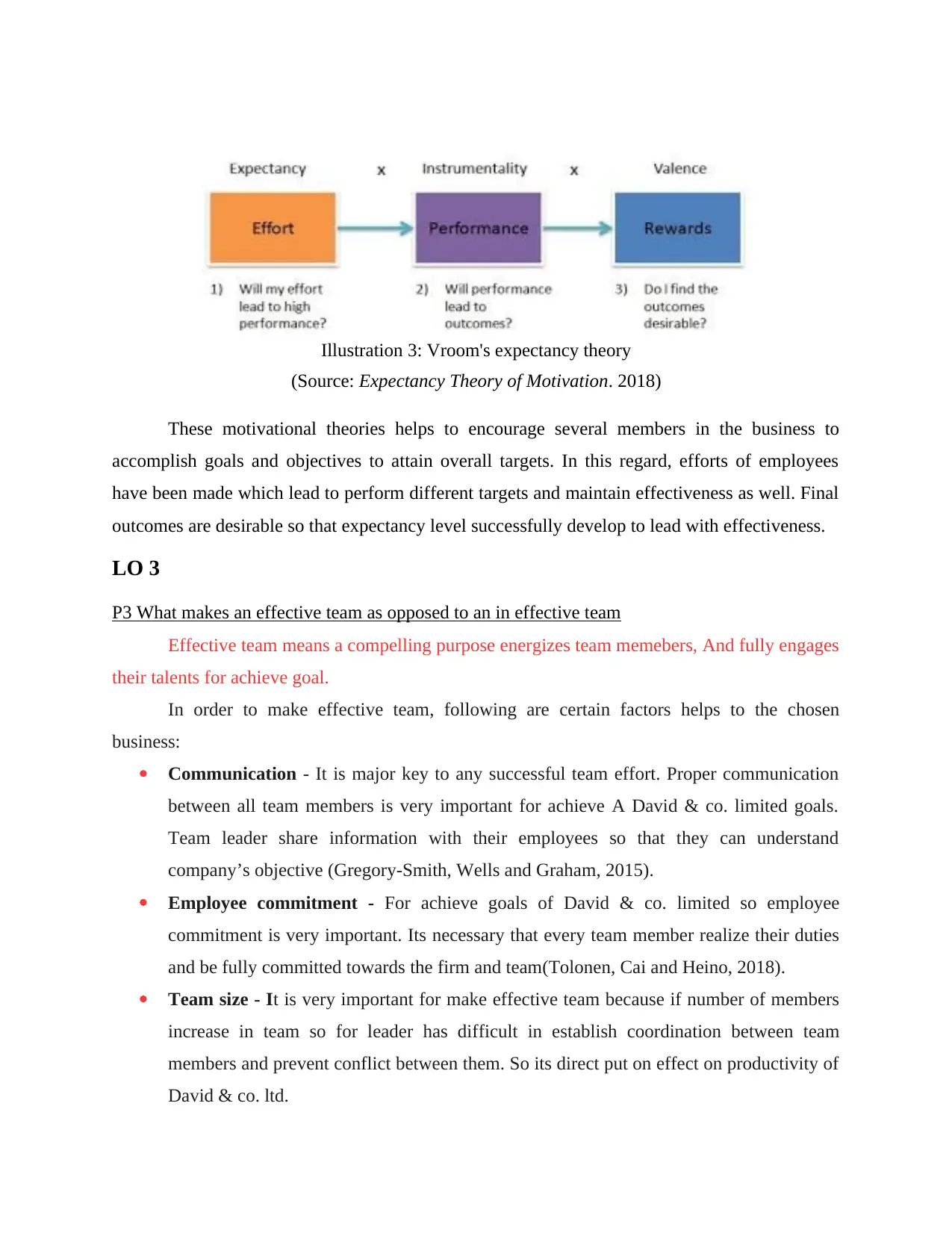
These motivational theories helps to encourage several members in the business to
accomplish goals and objectives to attain overall targets. In this regard, efforts of employees
have been made which lead to perform different targets and maintain effectiveness as well. Final
outcomes are desirable so that expectancy level successfully develop to lead with effectiveness.
LO 3
P3 What makes an effective team as opposed to an in effective team
Effective team means a compelling purpose energizes team memebers, And fully engages
their talents for achieve goal.
In order to make effective team, following are certain factors helps to the chosen
business:
Communication - It is major key to any successful team effort. Proper communication
between all team members is very important for achieve A David & co. limited goals.
Team leader share information with their employees so that they can understand
company’s objective (Gregory-Smith, Wells and Graham, 2015).
Employee commitment - For achieve goals of David & co. limited so employee
commitment is very important. Its necessary that every team member realize their duties
and be fully committed towards the firm and team(Tolonen, Cai and Heino, 2018).
Team size - It is very important for make effective team because if number of members
increase in team so for leader has difficult in establish coordination between team
members and prevent conflict between them. So its direct put on effect on productivity of
David & co. ltd.
Illustration 3: Vroom's expectancy theory
(Source: Expectancy Theory of Motivation. 2018)
accomplish goals and objectives to attain overall targets. In this regard, efforts of employees
have been made which lead to perform different targets and maintain effectiveness as well. Final
outcomes are desirable so that expectancy level successfully develop to lead with effectiveness.
LO 3
P3 What makes an effective team as opposed to an in effective team
Effective team means a compelling purpose energizes team memebers, And fully engages
their talents for achieve goal.
In order to make effective team, following are certain factors helps to the chosen
business:
Communication - It is major key to any successful team effort. Proper communication
between all team members is very important for achieve A David & co. limited goals.
Team leader share information with their employees so that they can understand
company’s objective (Gregory-Smith, Wells and Graham, 2015).
Employee commitment - For achieve goals of David & co. limited so employee
commitment is very important. Its necessary that every team member realize their duties
and be fully committed towards the firm and team(Tolonen, Cai and Heino, 2018).
Team size - It is very important for make effective team because if number of members
increase in team so for leader has difficult in establish coordination between team
members and prevent conflict between them. So its direct put on effect on productivity of
David & co. ltd.
Illustration 3: Vroom's expectancy theory
(Source: Expectancy Theory of Motivation. 2018)
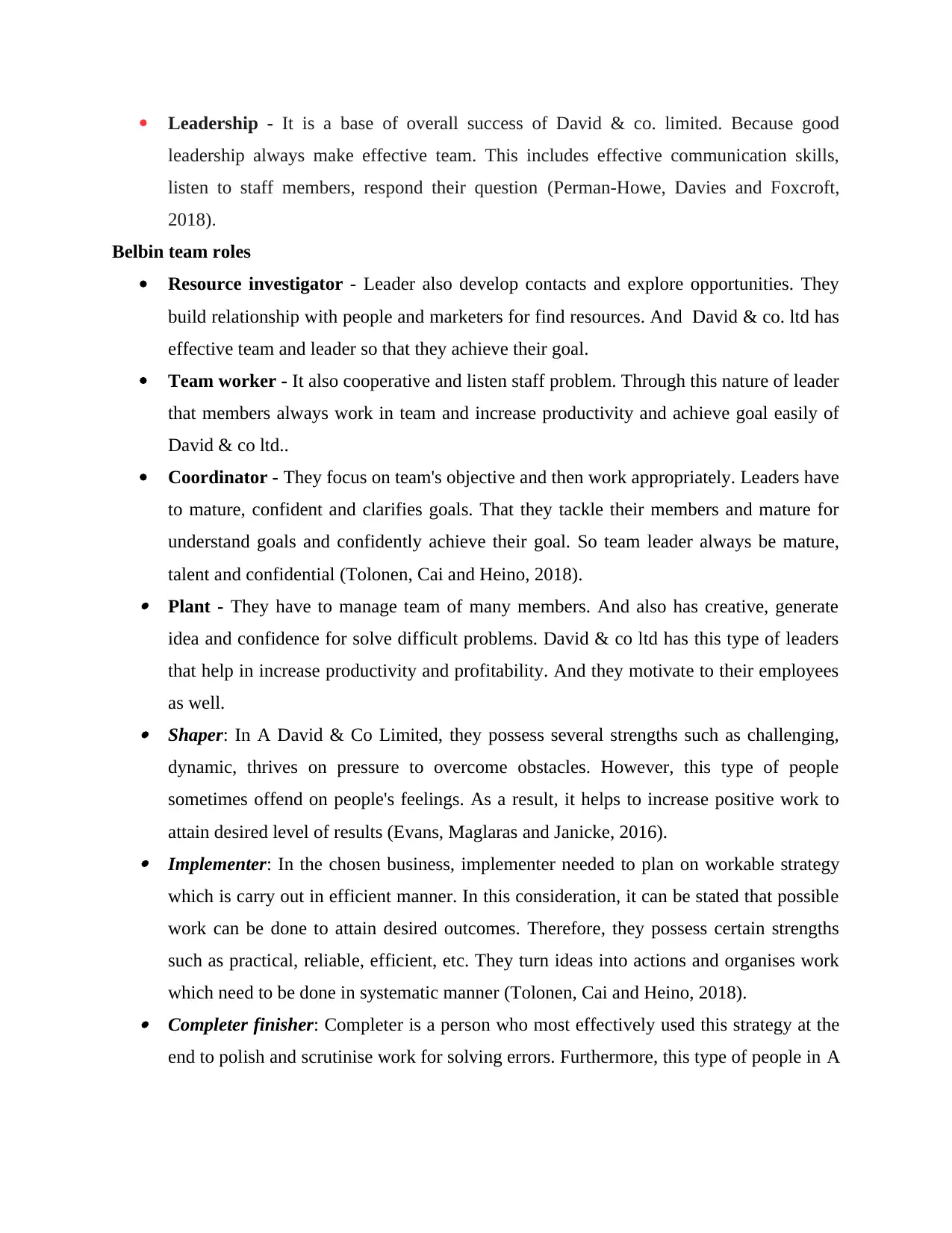
Leadership - It is a base of overall success of David & co. limited. Because good
leadership always make effective team. This includes effective communication skills,
listen to staff members, respond their question (Perman-Howe, Davies and Foxcroft,
2018).
Belbin team roles
Resource investigator - Leader also develop contacts and explore opportunities. They
build relationship with people and marketers for find resources. And David & co. ltd has
effective team and leader so that they achieve their goal.
Team worker - It also cooperative and listen staff problem. Through this nature of leader
that members always work in team and increase productivity and achieve goal easily of
David & co ltd..
Coordinator - They focus on team's objective and then work appropriately. Leaders have
to mature, confident and clarifies goals. That they tackle their members and mature for
understand goals and confidently achieve their goal. So team leader always be mature,
talent and confidential (Tolonen, Cai and Heino, 2018). Plant - They have to manage team of many members. And also has creative, generate
idea and confidence for solve difficult problems. David & co ltd has this type of leaders
that help in increase productivity and profitability. And they motivate to their employees
as well. Shaper: In A David & Co Limited, they possess several strengths such as challenging,
dynamic, thrives on pressure to overcome obstacles. However, this type of people
sometimes offend on people's feelings. As a result, it helps to increase positive work to
attain desired level of results (Evans, Maglaras and Janicke, 2016). Implementer: In the chosen business, implementer needed to plan on workable strategy
which is carry out in efficient manner. In this consideration, it can be stated that possible
work can be done to attain desired outcomes. Therefore, they possess certain strengths
such as practical, reliable, efficient, etc. They turn ideas into actions and organises work
which need to be done in systematic manner (Tolonen, Cai and Heino, 2018). Completer finisher: Completer is a person who most effectively used this strategy at the
end to polish and scrutinise work for solving errors. Furthermore, this type of people in A
leadership always make effective team. This includes effective communication skills,
listen to staff members, respond their question (Perman-Howe, Davies and Foxcroft,
2018).
Belbin team roles
Resource investigator - Leader also develop contacts and explore opportunities. They
build relationship with people and marketers for find resources. And David & co. ltd has
effective team and leader so that they achieve their goal.
Team worker - It also cooperative and listen staff problem. Through this nature of leader
that members always work in team and increase productivity and achieve goal easily of
David & co ltd..
Coordinator - They focus on team's objective and then work appropriately. Leaders have
to mature, confident and clarifies goals. That they tackle their members and mature for
understand goals and confidently achieve their goal. So team leader always be mature,
talent and confidential (Tolonen, Cai and Heino, 2018). Plant - They have to manage team of many members. And also has creative, generate
idea and confidence for solve difficult problems. David & co ltd has this type of leaders
that help in increase productivity and profitability. And they motivate to their employees
as well. Shaper: In A David & Co Limited, they possess several strengths such as challenging,
dynamic, thrives on pressure to overcome obstacles. However, this type of people
sometimes offend on people's feelings. As a result, it helps to increase positive work to
attain desired level of results (Evans, Maglaras and Janicke, 2016). Implementer: In the chosen business, implementer needed to plan on workable strategy
which is carry out in efficient manner. In this consideration, it can be stated that possible
work can be done to attain desired outcomes. Therefore, they possess certain strengths
such as practical, reliable, efficient, etc. They turn ideas into actions and organises work
which need to be done in systematic manner (Tolonen, Cai and Heino, 2018). Completer finisher: Completer is a person who most effectively used this strategy at the
end to polish and scrutinise work for solving errors. Furthermore, this type of people in A
⊘ This is a preview!⊘
Do you want full access?
Subscribe today to unlock all pages.

Trusted by 1+ million students worldwide
1 out of 17
Related Documents
Your All-in-One AI-Powered Toolkit for Academic Success.
+13062052269
info@desklib.com
Available 24*7 on WhatsApp / Email
![[object Object]](/_next/static/media/star-bottom.7253800d.svg)
Unlock your academic potential
Copyright © 2020–2026 A2Z Services. All Rights Reserved. Developed and managed by ZUCOL.





